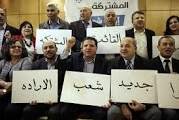Netanyahu’s Fear Mongering Attack on Palestinians – Rooted in Zionism
parties – agreed on a most basic principle: there should be equality under law
and in practice between them and Israeli-Jews. Everything else, the peace
process, the two state solution, could fall to the side. Netanyahu’s
demographic fear-mongering is rooted in the foundation of the Zionist project
in Palestine and demographic engineering to ensure political power remains in
the hands of one ethno-religious group.
Meet the Knesset Members from the Joint List
Mondoweiss
citizens. The hard data is revealing: voter turnout jumped by ten-percent from
the last election and in the Joint Arab List’s party leader’s home district it
was nearly an unheard of 80-percent. Civic engagement is happening, but that is
not the only turn. The joint list is full of fresh faces with seven first time
Knesset members, and two women, five communists, two national democrats, two
Islamists, one Christian and one Israeli-Jew.
directional shift inside of the bloc. He uses a civil rights framework, noted
for quoting Martin Luther King Jr. while campaigning, telling voters he sees
the party as a vehicle to mobilize mass non-violent civil disobedience. In
Haifa days before the election Odeh said he wanted to organize an equal rights
march of thousands of Palestinian citizens of Israel and Jewish-Israelis in one
year’s time.
partnership-not just coexistence with Jewish-Israelis-is widely endorsed. He
has a long history in politics. He held his first position in public office in
Haifa’s city council at the age of 23 as a member of Israel’s Jewish-Arab
communist party, Hadash. There he fought for student tax breaks and quickly
rose up the political ranks to become Hadash’s chairman while still in his 30s.
parties that were coerced to run on a single ticket after the Israeli election
threshold was increased, an obstacle propelled by right-wing groups. The
perception was hardliners wanted Arab parties out of Knesset. The way they
could achieve this was to force an ultimatum: Arab political groups, and one
mixed party, would have to unite in a country where political divisions can be
lethal to a faction’s survival.
divides alive, running on two lists instead of one, and still made it into
Knesset. The primary discords are between the Islamist and communist, the two
largest factions inside of the bloc. They differ in areas of labor and women’s
rights. Do you support the separation of religion and state, the secular
parties asked the Islamic group during a six-week period where they hashed out
their disagreements? It was a genuine coming to terms. “Yes,” they
said, “Because we don’t want to live in a Jewish state,” relayed
Knesset-elect and first time politician Aida Touma-Suleiman while still on the
campaign trail at an event in Tel Aviv in early March. Touma-Suleiman is a
celebrated feminist. Though she has been a member of the communist party for
over two decades, this will be her first time in public office.
Many supporters have said Odeh represents “a new way forward” for
Arab parties in Israel. He is deeply influenced by Martin Luther King Jr. and
the civil rights struggle in the U.S., along with his upbringing in a mixed
Jewish-Arab community. Odeh believes in securing the rights of Palestinian
citizens of Israel by working with Jewish-Israeli partners. In this election
season he became well known amongst Israelis after a televised debate with
Avigdor Liberman who said Odeh should not be allowed to speak in Israel, and
should go to the West Bank.
Ghnaim is a current Knesset member from an Islamic party and a teacher by
profession. He has a degree in middle eastern history from the University of
Haifa. He previously served on the city council of his home town Sakhnin, in
northern Israel.
Zahalka is has been a member of Knesset since 2003. He is the leader of the
national democratic party, Balad. He assumed the chariman position after former
head Azmi Bishara went into exile.
Out of all of the joint list’s Knesset members, Tibi has the longest history
inside of Israel’s parliament. He has served since 1999 and is the co-founder
of Ta’al and Islamic party. He is a vocal advocate for the Palestinian right of
return for refugees. Before entering politics Tibi was a gynecologist.
Touma-Suleiman has been a member of Hadash for decades and this will be her
first time in public office. She is the founder of the feminist organization
Women Against Violence and is the editor-in-chief of al-Ittihad, an Arabic
daily newspaper published in Israel.
Hajj Yahya is an engineer by training and this will be his first time as a
member of Knesset.
Zoabi is perhaps the most well-known Palestinian citizen of Israel serving in
Knesset. She has held this position since 2009 and during her term in public
service she has been attacked while speaking on the Knesset floor, and holds
the title of the Knesset member with the longest suspension from office in
Israel’s history. During election season, she was physically assaulted while
speaking at a debate, along with a Jewish-Israeli spokesperson for the Joint
List. Prior to entering politics Zoabi was a journalist.
Khenin is the Joint Arab List’s only Jewish-Israeli member to be elected into
Knesset. He is a veteran member of Knesset, serving since 2006. Khenin is a
political scientist with a PhD from Hebrew University.
Abu Arar is a prominent Bedouin politician and attorney. He first entered
Knesset in 2013. Before, Abu Arar was the head of a local council in the Negev.
Jabarin is from Umm el-Fahm, a village in northern Israel that is regarded as a
political stronghold for Palestinian citizens of Israel. He hold a PhD in law
with a specialty in human rights. This will be his first term in Knesset.
Ghattas is a seasoned political figure. He co-founded the Balad party with his
cousin Azmi Bishara in 1995, although he did not enter Knesset until 2013. He
holds a PhD in engineering from Technion, and is of a Christian background.
Saadi is a human rights lawyer known for working on issues relating to
Palestinian prisoners. This will be his first term in Knesset.
Abu Marouf is the only Druze member of Joint Arab List to enter Knesset. He is
the founder of the Druze Initiative Committee and works with Physicians for
Human Rights, as he is also a urologist.
an electioneering tactic. Such fear-mongering is rooted in the foundation of
the Zionist project in Palestine.
The Nation




